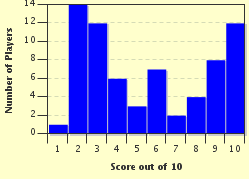Quiz Answer Key and Fun Facts
1. Which of the following is the correct description of the Egyptian deity Aken?
2. Which of the following is a correct description of the god Aker (also spelled Akar)?
3. Which of the following is the correct description of the Egyptian entity Ammut (also spelled Ammit or Ahemait)?
4. Which of the following is the correct description of the Egyptian god Amun (also spelled Amen or Amon)?
5. Which of the following is the correct description of the Egyptian goddess Amunet (also spelled Amonet or Amaune)?
6. Which of the following is the correct description of the Egyptian god Anhur (also spelled Onuris, Onouris, An-Her, Anhuret, Han-Her, and Inhert)?
7. Which of the following is the correct description of the Egyptian goddess Anput?
8. Which of the following is the correct description of the Egyptian god Anubis?
9. Which of the following is the correct description of the Egyptian goddess Anuket?
10. Which of the following is the correct description of the Egyptian god Apophis?
Source: Author
History1066
This quiz was reviewed by FunTrivia editor
looney_tunes before going online.
Any errors found in FunTrivia content are routinely corrected through our feedback system.

